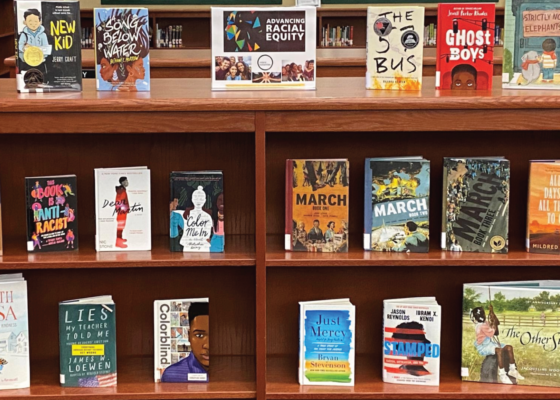Back to School with Indiana Humanities
August 30, 2016As teachers and students settle into the new school year, we’re sharing a few resources to round out your humanities offerings: Talk about students’ vision for The Next Indiana. To accompany the…
As teachers and students settle into the new school year, we’re sharing a few resources to round out your humanities offerings:
- Talk about students’ vision for The Next Indiana. To accompany the special “Next Indiana” episode of new the WFYI documentary film series Hoosiers: The Story of Indiana, Indiana Humanities now offers a companion discussion guide to help you host a community or classroom discussion of the film. Schools and other tax-exempt orgs who host a screening are eligible for a copy of the film and $100 stipend. Download the discussion guide and learn how to qualify for the stipend here. Recommended for grades 5 and up.
- Debate key ethical moments in Indiana history. Listen in to our three-part series of podcasts, produced in partnership with DePauw University’s Prindle Institute for Ethics, exploring key the moral and ethical dimensions of key moments from our part. Topics include the canals crisis of the 1830s and its long-term impact on infrastructure, different eras of immigration and the notion of Hoosier hospitality, and the changing purpose and methods of incarceration in our state. The episodes are a great jumping off point for historical and philosophical discussions in your classroom—and the podcast format is a great way to incorporate digital learning objectives. Learn more about the episodes here, and listen to the first episode, Canal Crisis, here. Recommended for grades 8 and up.
- Go ALL-IN to better understand the state of civic health in Indiana today. ALL-INgaged: Understanding and Activating Hoosier Communitiesis a standards-based curriculum for grades 6-12 focused on building students’ understanding of civic participation in Indiana and preparing them to be researchers and change-makers in their local communities. The curriculum can be implemented in a variety of settings, from the classroom to after-school programs. It works well with government, civics, geography, and other interdisciplinary social studies or humanities classes. To learn more about the program and download the curriculum, go here. Recommended for grades 6 and up.
- Celebrate Hoosier authors and discuss their visions for the Next Indiana. The Next Indiana Bookshelf is a collection of 13 titles with strong connections to Indiana, either set here or written by a Hoosier author. The collection encourages Hoosiers to think, read, and talk about the present and future of Indiana, and it includes fiction, nonfiction, essays, and poetry titles appropriate for all ages. Check out the books (and find them at a library near you!). And follow along on our blog as Bookshelf authors share their visions for the future of Indiana. Recommended for grades 4 and up (depending on titles).
- Chant about all things Indiana! The Indiana Chant is a special chant poem written especially for the Bicentennial by South Bend children’s author April Pulley Sayre. The Chant, featured on the Next Indiana Bookshelf, is a fun and interactive way to celebrate all things Hoosier in our Bicentennial year. Posters of the chant were mailed to all schools and libraries in Indiana last winter. Teachers, parents and students can download the Chant on our website. Recommended for grades K-6.
Our friends in the humanities community are offering additional opportunities for teachers and students, many timed to the Bicentennial, including:
- The Indiana Author Awards will host writing workshops with Indiana children’s authors designed just for teachers this fall. Head to the IAA website to keep up to date on upcoming workshops.
- Indiana Historical Society is offering more free Bicentennial teacherworkshops across the fall this year, in Terre Haute, Valparaiso and Corydon. See dates and sign up here.
- The Indiana State House Tour Office and the Indiana Center for the Book are sponsoring an essay competition in honor of Indiana’s Bicentennial and Indiana Statehood Day. The contest is open to any fourth grade student in Indiana. Essays should reflect the themes central to the Bicentennial, how students have celebrated, how it may have changed them, and what they believe is next for Indiana. Entries must be submitted by October 21, 2016. Learn more here.
- National History Club helps school chapters connect to a network of students and teachers around the country to learn, read, and write about history. Members of local History Club chapters create local projects, participate in activities based on chapter interest, and engage in local and national programs. There are seven chapters across the state of Indiana, and 550+ chapters in 44 states. To learn more about the program, what History Club chapters do, and how to apply, visit their website here.


